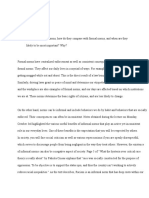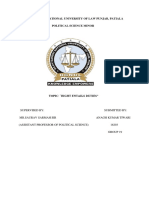Rights Require FoundationElla FoskettLSJ 381Section AD


The philosophies of liberalism tell us that as human beings we are all inherently endowedwith certain inalienable rights (Lecture 1). Ignoring the constraints society places on us, we areall individuals with the autonomy to claim these rights for ourselves. In this sense, rights are veryreal; we all possess certain rights because of the nature of humanity. However, just because weall possess a right in theory, does not mean that everyone has the tools to exercise that right in thegiven structure of a society. This does not mean that these individuals do not have or deservethese rights, but simply that they have been disadvantaged to a point where they are unable toclaim them. This however does not invalidate the idea that all people possess rights, but rather the legitimacy of the state charged with ensuring them. Because of disparities between rights onthe books and rights in practice, they are currently not a good method to provide individuals with protections, however rights can be built up and supported in ways that would eventually ensuretheir success.The reality in the United States is that rights were originally defined to bar certain groupsfrom obtaining them. We have now “progressed” to have color blind law, which means everyonemay be legally defined as equal. However, there has been very little work done to address theway in which the systems present in every facet of American life are built on values of racialoppression that are very much still present today. When you build a society premised on certain people having rights and others not, there must be significant work done to undo this hierarchy.You cannot simply declare equality in the law and expect civil society to correct itself. Theremust be significant work done and reparations given to undo the years of oppression that havedisadvantaged people to a point where they are unable to claim rights, even when legally givento them. When a state defines its citizens as equally able to claim rights, they ignore the societalimplications that actually bar certain groups from doing so, therefore turning a societal issue into
an individual one. Brown illustrates this philosophy, stating, “It may be that the withdrawal thatrights offer, the unmasking or destigmatizing they promise, has as its cost the loss of a languageto describe the character of domination, violation, or exploitation that configures such needs.”(Brown 1997, 121). As she explains, rights in definition from the state are not a valid avenue for providing individuals with the protection they deserve. They provide empty promises that do notaddress the historical realities that still very much impact individuals’ ability to interact withsociety today, and they do not provide avenues to claim a right you are currently unable to. Theyare empty promises from the state since they are unable to ensure equality and protection for everyone. As Bentham would say, standing alone, rights are simply “nonsense built on stilts”.While rights may be “nonsense built on stilts”, this is not to say that they are notnecessary for a functioning society. The problem is the way in which we are defining andviewing rights, not their basic ideology. We must be able to define rights so that people knowwhat they have the ability to claim, but the work cannot stop at the definition. Definingsomething as a right will never ensure that everyone is able to exercise it. Definition must beaccompanied by systems that provide every individual with an avenue for pursuing rights inrecognition of different starting places based on current and historical structural systems of power. Who is defined as having rights under the law is far less important than who has theability to practice them in daily life. Keeping focus on the law may prevent people from noticingthe contradictions that exist and gives them a false sense of victory. Polletta depicts this ideology,stating, “Rather than succumbing to the illusory freedom and equality promised by rights,activists should demand that their ‘needs’ be met rather than their ‘rights’ granted. (Tushnet1984)”. (Polletta 2000, 368). The focus for activists when claiming rights should be ensuringtangible changes and progress, and it is only by focusing on these aspects of rights that we can
enhance their power and turn rights into a tool that does more than define empty promises. Wemust raise our expectations of the state. No longer should we buy into the idea that the state hassuccessfully done their job when they recognize a right, we must hold the state accountable for ensuring that this right is accessible to everyone regardless of identity, in order to call it asuccess.In addition to systems that allow all individuals to claim rights, rights definitions must besupported by a shared societal consciousness that buys into them. Our government is a reflectionof our values as a society. The way in which we value and posit different identities in civilsociety influences those who will have the power to create and monitor the structures that governsociety. In this way, the state and its oppression are a reflection of the way in which those with power experience culture. Matua reflects this sentiment stating, “The state itself is a neutral, passive instrumentality— a receptacle or an empty vessel— that conveys savagery byimplementing the project of a savage culture.” (Matua 2001, 203). The question in America isnot if individuals should have rights, it is which individuals should have rights. In order toachieve a state that recognizes equality in practice, we must ask ourselves about the messages of value civil society is giving us, and change these messages to reflect a true realization of equity.As a society, we must collectively work to educate and reframe mindsets to teach compassionand equality so that everyone may have their rights recognized both by the state and in civilsociety. This happens in all facets of life and all societal cues we digest, however overt or hiddenthey may be.Changing the collective consciousness of civil society must start from an individualrecognition of oneself as being a rights bearing individual, despite barriers to practicing rights. If individuals view themselves as not worthy of a right, there is no chance they will be able to






